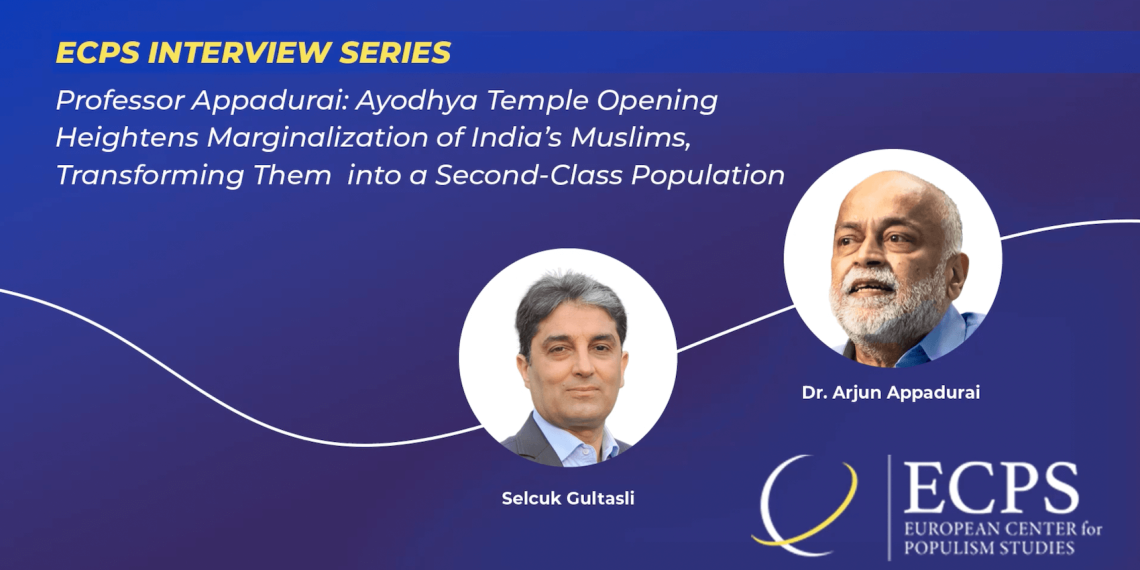In an exclusive interview, Professor Arjun Appadurai analyzed the inauguration of the Ayodhya Temple by Prime Minister Narendra Modi on Monday. He expressed concerns about the potential rise of Hindu majoritarianism and its impact on India’s significant Muslim population. Appadurai emphasized that the monumental structure, replacing the Babri Masjid, symbolizes a shift towards the marginalization of India’s Muslims, potentially relegating them to a second-class status. Alongside many analysts, Appadurai predicts that Modi is poised to maintain a formidable grip on power in the forthcoming Indian elections in April, unless unexpected shifts in the political landscape occur.
Interview by Selcuk Gultasli
In an exclusive interview with the European Center for Populism Studies (ECPS), Dr. Arjun Appadurai (Emeritus Professor of Media, Culture and Communication at New York University) underscores his concerns that the opening of the Ayodhya Temple under Prime Minister Narendra Modi raises the risks of Hindu majoritarianismon India’s sizable Muslim population, estimated at around 250 million.
Appadurai highlights the historical challenges faced by this minority, with intensified tensions following the recent construction of the Mega Ram Temple in Ayodhya. This monumental structure, replacing the Babri Masjid, symbolizes a shift towards the marginalization of India’s Muslims, transforming them into a second-class population. Appadurai points to domestic policies that foster insecurity among Muslims and explores the paradox of Modi’s alliances with Islamic leaders in Saudi Arabia and the United Arab Emirates.
According to Professor Appadurai, the inauguration of the Ram Temple consolidates Modi’s image as a righteous Hindu king, departing from historical dominance of Muslim monuments in North India. Appadurai also considers the national dimension, questioning the association of a temple with national identity and challenging conventional perceptions.
Professor Appadurai also delves into the intricate web of demagoguery, propaganda, and the socio-psychological factors that shape political landscapes. Appadurai challenges the conventional narrative by questioning the broad categorization of leaders as demagogic, emphasizing the ubiquitous nature of demagoguery in various forms. Central to the discussion is the exploration of "democracy fatigue," a concept introduced by Appadurai, shedding light on how demagogues tap into disillusionment with liberal democracy.
The conversation expands to the comparison of the political climates in Trump’s America and Modi’s India, unveiling surprising parallels in their success narratives driven by dissatisfaction with the state and societal shifts. Appadurai further unveils the nuanced dynamics in India, where Modi’s leadership seemingly catalyzes Western-style individualism within a traditionally hierarchical society, challenging standard liberal social theories. The interview provides a thought-provoking analysis of the emotional resonance, historical contexts, and unique factors contributing to the success of demagogic figures in diverse democratic settings.
Professor Appadurai underscores the shifting dynamics between the success of the right and the failure of the left, urging a departure from the conventional hydraulic theory. Appadurai emphasizes the transformation of the concept of "the people" by the right, evolving into a pre-political, quasi-biological entity. This conceptual shift, operating on an emotional rather than analytical level, challenges traditional categorizations and contributes to the erosion of democratic institutions.
The interview also explores the concept of polymorphous populism, linking it to the digitalization of society. Appadurai highlights the significance of social media in facilitating the rapid formation of movements, creating a volatile environment with a lack of enduring entities. He draws attention to the emotional bonding fostered by social media, providing a platform for right-wing leaders like Donald Trump and Modi to strategically bolster their power.
Our interview concludes with Professor Appadurai’s prediction for the upcoming Indian elections in April, expressing a prevailing sentiment that Modi is likely to maintain a strong hold on power unless unforeseen shifts occur.


